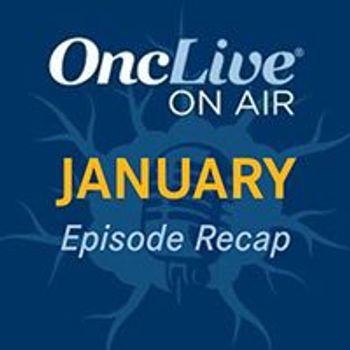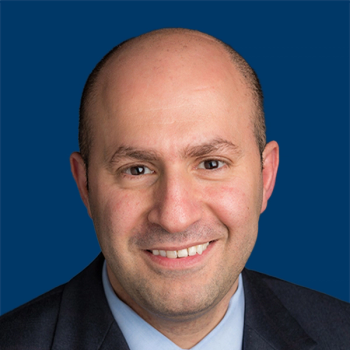
The NCCN Guidelines for metastatic uveal melanoma now recommend HEPZATO KIT as a Category 2A treatment option for patients with hepatic-dominant disease.

Your AI-Trained Oncology Knowledge Connection!


Associate Editor, OncLive
Ashling Wahner joined MJH Life Sciences in 2022. She produces OncLive's podcast, OncLive On Air, and helps ensure timely publication of news content and announcements from the FDA approval pipeline. She also attends conferences live and virtually to conduct video interviews and produce written coverage. Email: awahner@mjhlifesciences.com

The NCCN Guidelines for metastatic uveal melanoma now recommend HEPZATO KIT as a Category 2A treatment option for patients with hepatic-dominant disease.

The combination of first-line avelumab and axitinib was effective and safe in a real-world analysis of patients with advanced RCC.

UGN-102 generated robust, durable responses in patients with low-grade, intermediate-risk NMIBC, in analyses of the phase 3 ENVISION and ATLAS studies.

The FDA has approved vimseltinib for the treatment of patients with tenosynovial giant cell tumor.

NKTR-255 combined with CD19-directed CAR T-cell therapy improved 6-month CR rates vs placebo in patients with relapsed/refractory large B-cell lymphoma.

Kathleen N. Moore, MD, MS, discusses ongoing trials of novel ADCs in ovarian cancer and the potential relevance of biomarker expression for these agents.

Neoadjuvant atezolizumab plus trastuzumab, pertuzumab, and abbreviated epirubicin generated pCRs in patients with early HER2-positive breast cancer.

Lisocabtagene maraleucel elicited a statistically significant overall response rate in adult patients with relapsed/refractory MZL.

KN026 plus docetaxel elicited durable responses and a manageable safety profile in patients with recurrent/metastatic HER2-positive breast cancer.

The FDA granted RMAT designation to gemogenovatucel-T for maintenance treatment after frontline chemotherapy in advanced HRP ovarian cancer.

The European Commission has approved serplulimab in combination with carboplatin and etoposide for the frontline treatment of adult patients with ES-SCLC.

The variety of nonclassical EGFR mutations in NSCLC necessitates the development of unique treatment strategies based on individual mutational profiles.

In case you missed any, read a recap of the episodes of OncLive On Air that aired in January 2025.

Anetumab ravtansine plus bevacizumab failed to improve efficacy vs paclitaxel plus bevacizumab in platinum-resistant high-grade ovarian cancer.

CAR T-cell therapies are associated with a risk for second primary cancers, and mitigation strategies for these toxic effects are warranted and under examination.

Azenosertib (ZN-c3) monotherapy was active in heavily pretreated patients with cyclin E1–positive platinum-resistant ovarian cancer.

Toni Choueiri, MD, discusses the unique features of NKT2152, the agent’s safety profile in RCC, and future research directions across GU oncology.

The FDA approved T-DXd for unresectable/metastatic HR+, HER2-low/-ultralow breast cancer that progressed on endocrine therapy in the metastatic setting.

Detectable ctDNA after neoadjuvant chemotherapy was associated with the recommendation for TME in patients with T1-3, N0 low or mid rectal cancer.

The EMA has accepted for review an MAA seeking the approval of nogapendekin alfa inbakicept plus BCG for BCG-unresponsive NMIBC with CIS.

ctDNA positivity was associated with worse DFS overall but significantly better DFS with celecoxib vs placebo in stage III resected colon cancer.

Zoldonrasib was well tolerated and associated with manageable AEs and preliminary antitumor activity in patients with KRAS G12D–mutated PDAC.

Galinpepimut-S demonstrated early efficacy signals in patients with acute myeloid leukemia in second complete remission or later.

David Rimm, MD, PhD, discusses pathology limitations that have been exacerbated by the current lineup of breast cancer IHC tests.

The FDA has granted a breakthrough device designation to the DCISionRT test for patients with breast cancer with ductal carcinoma in situ.

Frontline dostarlimab plus chemotherapy has been approved in the EU for all adult patients with primary advanced or recurrent endometrial cancer.

The addition of pembrolizumab to preoperative radiation therapy followed by surgery prolonged DFS in patients with soft tissue sarcoma of the extremity.

Tovorafenib generated durable drug holiday responses in pediatric patients with BRAF-altered relapsed/refractory low-grade glioma.

LOAd703 has been granted FDA fast track designation for the treatment of patients with pancreatic cancer.

The FDA has approved acalabrutinib plus bendamustine and rituximab for adult patients with previously untreated MCL who are ineligible for autologous HSCT.